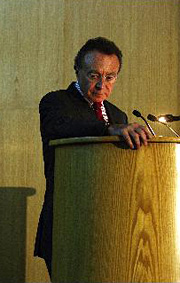
|  |  |  Business News | August 2008 Business News | August 2008  
Mexico Bank Raises Key Rate for Third Straight Month
 Jens Erik Gould - Bloomberg Jens Erik Gould - Bloomberg
go to original


| | Guillermo Ortiz, Mexico's Central Bank governor, speaks during a presentation of the bank's quarterly inflation report in Mexico City, Jan. 30, 2008. (Susana Gonzalez/Bloomberg News) | | |
Mexico's central bank increased its benchmark interest rate for the third straight month while signaling that easing commodity prices and slower economic growth may reduce the need for further tightening.

The bank's five-member board, led by Governor Guillermo Ortiz, raised the key lending rate a quarter of a percentage point to 8.25 percent today, the highest since December 2005. Policy makers in Brazil, Chile and Peru also lifted rates at their most recent meetings to curb higher consumer prices.

Banco de Mexico said the risks of an economic slowdown have increased, and that food and energy prices may ease soon, putting a damper on the fastest inflation in almost four years. The bank's "dovish" comments indicate it is less likely to raise rates again this year, said Benito Berber, a strategist at RBS Greenwich Capital Markets in Greenwich, Connecticut.

"Banxico will most likely not hike anymore," Berber said, referring to the central bank. "Those statements are very clear and characterize a very dovish view."

Mexico's peso slid 0.5 percent to 10.2179 per dollar at 11:35 a.m. New York time, from 10.1684 yesterday, on the reduced likelihood of further rate increases this year.

Today's rate increase aims to anchor inflation expectations and will help reduce annual inflation to the bank's target of 3 percent by 2010, policy makers said. Inflationary pressures are originating in the supply side rather than from demand, the bank said in a statement accompanying its decision.

"The board considers that this monetary policy posture, added to the described environment, will allow inflation in Mexico to adjust to the mentioned forecasts," the bank said.

Inflation Outlook

The bank said last month that inflation will probably remain above its target until 2010, after previously saying it expected to reach its objective in 2009.

On July 30, the bank surprised analysts by raising its inflation forecasts by an average of 0.89 percentage point over the next two years. It said annual inflation will accelerate to as high as 6 percent in the fourth quarter, up from a previous forecast of no more than 4.75 percent.

Consumer prices climbed 5.39 percent in July from a year earlier, driven by higher costs for food and gasoline. It was the sixth straight month inflation accelerated.

Yields on Mexico's 10 percent bond due December 2024, the country's most-traded security, fell 13 basis points today, or 0.13 percentage point, to 8.68 percent, the lowest in about two months. The price rose 1.18 centavo to 111.45 centavos per peso, according to Banco Santander SA.

Gasoline and tortillas

There is still a risk of quickening inflation in Mexico, said Gray Newman, chief Latin America economist with Morgan Stanley in New York, citing moves by the government to increase gasoline prices and the chance of tortilla makers charging more.

"Inflation is still going to show large enough numbers to keep the central bank convinced it needs an insurance policy," said Newman, who forecasts the bank will raise the rate to 8.75 percent this year.

Ortiz said July 30 that the government will gradually reduce fuel subsidies, which will cost about $20 billion in 2008, and said the bank had incorporated an increase in gasoline into its decision to raise inflation forecasts.

Mexican President Felipe Calderon in June announced an accord with industry groups to freeze the price of canned tuna, coffee, juices and about 150 other items in a bid to hold down prices. Wheat, corn and rice reached records on global markets this year, before retreating because of improved crop forecasts and a strengthening dollar.

Calderon has also tried to fight higher food prices by lifting import tariffs on corn, wheat, rice and beans in May. He eliminated import taxes on nitrogen-based fertilizer, and cut in half the tax on imported powdered milk.

To contact the reporter on this story: Jens Erik Gould in Mexico City at jgould9(at)bloomberg.net |

 |
|  |



